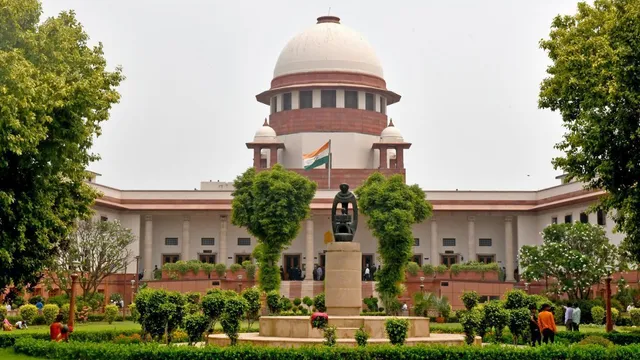- By Imran Zafar
- Sat, 12 Apr 2025 04:12 PM (IST)
- Source:JND
The Supreme Court ruled that the President must decide on bills reserved for her consideration by the governor within three months of receiving such reference. The apex court stated that any delay beyond this period must be justified with appropriate reasons, which should be communicated to the concerned state. The ruling comes four days after the court cleared 10 Tamil Nadu bills that were reserved by Governor R N Ravi for presidential consideration. The detailed judgment, spanning 415 pages, was uploaded late on Friday night.
The Supreme Court found it appropriate to adopt the timeline suggested by the Ministry of Home Affairs and directed that the President must decide on bills reserved by the Governor within three months from the date the reference is received.
"In case of any delay beyond this period, appropriate reasons would have to be recorded and conveyed to the concerned State. The States are also required to be collaborative and extend co-operation by furnishing answers to the queries which may be raised and consider the suggestions made by the Central government expeditiously," the top court said as quoted by news agency PTI.
A bench comprising Justices JB Pardiwala and R Mahadevan declared the reservation of the 10 bills for presidential consideration in the second round as illegal and erroneous. It clarified that if the President withholds assent to a bill reserved by the governor, the concerned state government can challenge such action in court.
The court invoked Article 200 of the Constitution, which allows governors to assent, withhold assent, or reserve bills for presidential consideration. However, it criticised the misuse of this provision to indefinitely delay legislation. The court stressed that despite the absence of a specific timeline in Article 200, it cannot be interpreted to permit inaction that hampers the legislative process.
Timeline For Governor's Role In Lawmaking
The Supreme Court judgment laid down clear deadlines for the governor's actions to ensure the timely processing of legislation. It stated that the governor must act on bills, based on the advice of the Council of Ministers, within a maximum period of one month. If the governor chooses to withhold assent contrary to this advice, the bill must be returned to the legislative assembly with a message within three months.
Similarly, if the governor decides to reserve the bill for the President's consideration against the advice of the Council of Ministers, this action must also be taken within a maximum of three months. In cases where a bill is re-presented to the governor after being returned earlier, the governor is required to grant assent within one month.
The court made it clear that governors do not possess a "pocket veto" or "absolute veto" and cannot sit indefinitely on bills. Similarly, the President is bound by Article 201 to either assent to or withhold assent to a bill and cannot arbitrarily delay the decision.
ALSO READ: Delhi: Live-In Partner Kills Woman In Munirka After A Party Over Alleged Affair
The court further ruled that failure to act within these prescribed limits would invite judicial review. It directed the registry to send copies of the judgment to all High Courts and the principal secretaries to governors across states.
The bench exercised its plenary powers under Article 142 to deem the 10 Tamil Nadu bills re-presented and passed. It also stated that the constitutional framework does not allow any constitutional authority to act arbitrarily.
The ruling stems from a petition filed by the Tamil Nadu government in 2023 after alleging undue delay by Governor R N Ravi in granting assent to 12 bills, including one pending since 2020. On November 13, 2023, the governor withheld assent to 10 bills, prompting the legislative assembly to re-enact them in a special session on November 18. Some were later reserved for the President, leading to the present verdict.
(With PTI Inputs)

